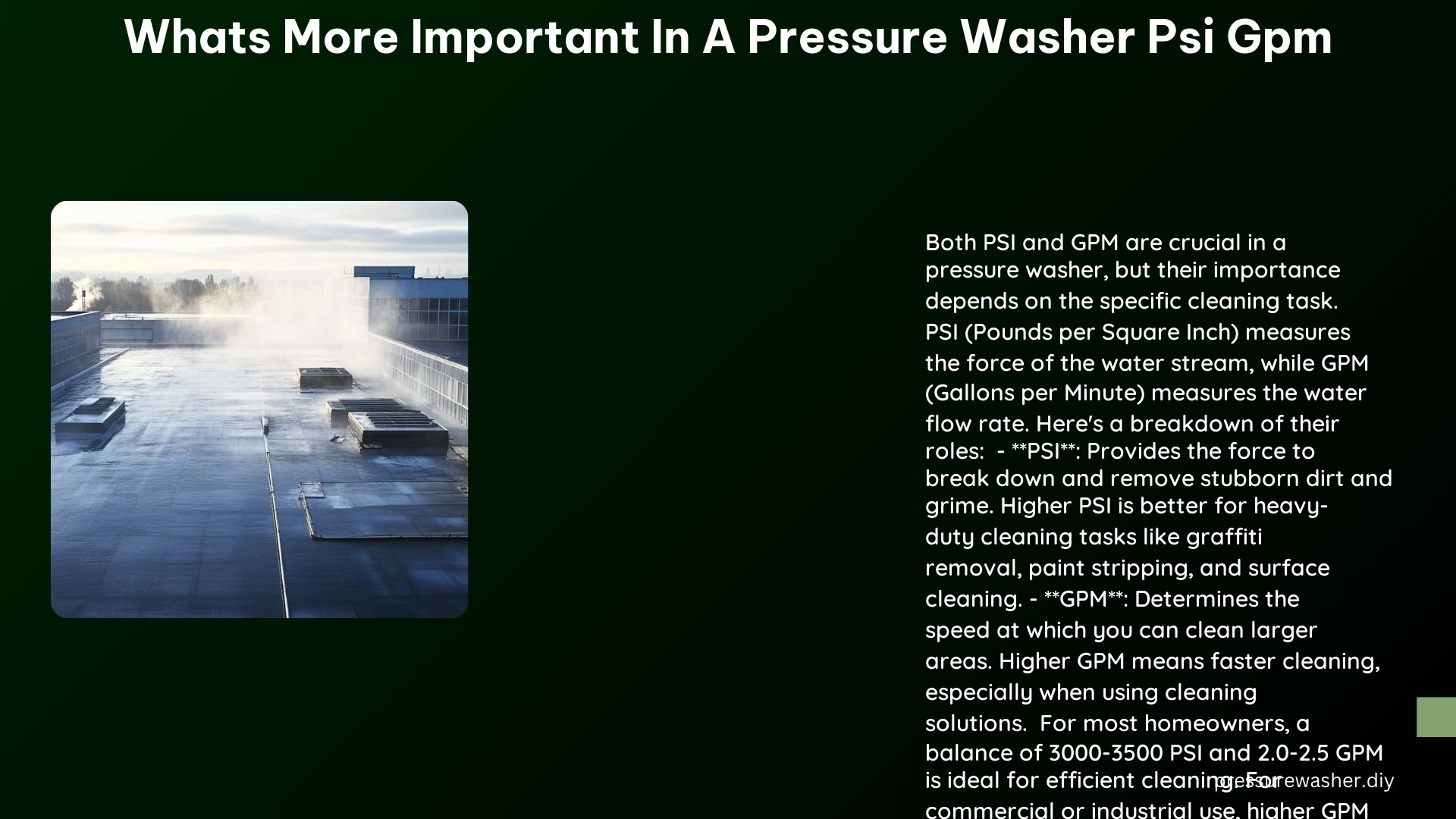When it comes to pressure washers, both PSI (Pounds per Square Inch) and GPM (Gallons per Minute) are crucial specifications that determine the overall cleaning performance and efficiency of the machine. Understanding the differences and the importance of these two metrics is essential for selecting the right pressure washer for your specific cleaning needs.
Pressure Washer PSI: The Power Factor
PSI Definition: PSI measures the force or pressure of the water stream, indicating how effectively it can remove stubborn dirt, grime, and other tough debris from surfaces.
Impact of PSI:
– Higher PSI ratings (e.g., 3000-4000 PSI) are better suited for heavy-duty tasks such as graffiti removal, paint stripping, and deep surface cleaning. These high-pressure water streams can effectively blast away even the most stubborn contaminants.
– Lower PSI ratings (e.g., 2000 PSI) are more suitable for lighter cleaning tasks like house washing, car cleaning, and gentle surface cleaning. While they may not have the same level of raw power, lower PSI settings can still effectively clean without risking damage to delicate surfaces.
– Excessive PSI can potentially cause damage to certain materials, such as soft wood, delicate paint, or even skin. Caution and proper technique are necessary when using pressure washers with high PSI ratings.
Pressure Washer GPM: The Flow Factor

GPM Definition: GPM measures the water flow rate, indicating how quickly the pressure washer can clean larger areas.
Impact of GPM:
– Higher GPM ratings (e.g., 3.5-5.0 GPM) are ideal for cleaning larger areas quickly and efficiently. The increased water flow allows for faster coverage and rinsing of dirt and grime.
– Lower GPM ratings (e.g., 1.1 GPM) may result in longer cleaning times, as the machine will take more time to cover the same surface area.
– GPM is particularly important for tasks that require rinsing away dirt and grime, such as surface cleaning, deck cleaning, and vehicle washing. The higher the GPM, the more effectively the pressure washer can flush away loosened contaminants.
PSI vs. GPM: Balancing the Equation
Balanced Approach: Both PSI and GPM are equally important in a pressure washer, as they work together to provide efficient and effective cleaning power. The optimal balance between these two metrics will depend on the specific cleaning tasks you need to perform.
Job-Specific Prioritization:
– For tasks requiring heavy-duty cleaning, such as graffiti removal or paint stripping, PSI may be the more important factor, as the high-pressure water stream is crucial for breaking down and removing stubborn contaminants.
– For tasks requiring quick cleaning of larger areas, such as deck or driveway cleaning, GPM may be the more important factor, as the increased water flow can cover more ground in less time.
Cleaning Units (CU): A useful metric for comparing pressure washers is the Cleaning Units (CU) formula, which multiplies PSI by GPM to give a total cleaning potential. This can help you determine the overall cleaning power of a pressure washer and make more informed purchasing decisions.
Technical Specifications and Recommendations
Recommended Range: For most homeowner-level cleaning tasks, a pressure washer with a PSI rating of 3000-3500 and a GPM rating of 2.0-2.5 is generally considered a good starting point. This balanced combination of power and flow rate can handle a wide range of cleaning jobs effectively.
Engine Horsepower and Pump Quality: In addition to PSI and GPM, other important factors that contribute to a pressure washer’s overall performance include the engine horsepower and the quality of the pump. Higher horsepower engines and high-quality pumps can help deliver more consistent and reliable cleaning power.
Pressure Washer Accessories: The type and quality of the accessories, such as nozzles, wands, and hoses, can also impact the overall cleaning performance of a pressure washer. Investing in high-quality accessories can help optimize the machine’s capabilities and ensure a more efficient and effective cleaning experience.
Conclusion
In the world of pressure washers, both PSI and GPM are crucial specifications that work together to determine the overall cleaning power and efficiency of the machine. While the specific importance of each metric may vary depending on the cleaning task at hand, a balanced approach that considers both factors, along with other technical specifications and accessories, is essential for selecting the right pressure washer for your needs. By understanding the nuances of PSI and GPM, you can make an informed decision and ensure that your pressure washer delivers the cleaning performance you require.
References:
1. Pro Tool Reviews. (2021). Pressure Washer PSI vs GPM | What’s More Important? Retrieved from https://www.protoolreviews.com/pressure-washer-psi-vs-gpm-whats-more-important/
2. Reddit. (2021). What is more important, GPM or PSI? Retrieved from https://www.reddit.com/r/pressurewashing/comments/m5cjdb/what_is_more_important_gpm_or_psi/
3. Alkota. (n.d.). GPM vs. PSI in Pressure Washers, What’s the Difference? Retrieved from https://alkota.com/gpm-vs-psi-in-pressure-washers/
4. Simpson Cleaning. (2019). PSI vs. GPM: What Matters Most? Retrieved from https://simpsoncleaning.com/psi-vs-gpm-what-matters-most/
